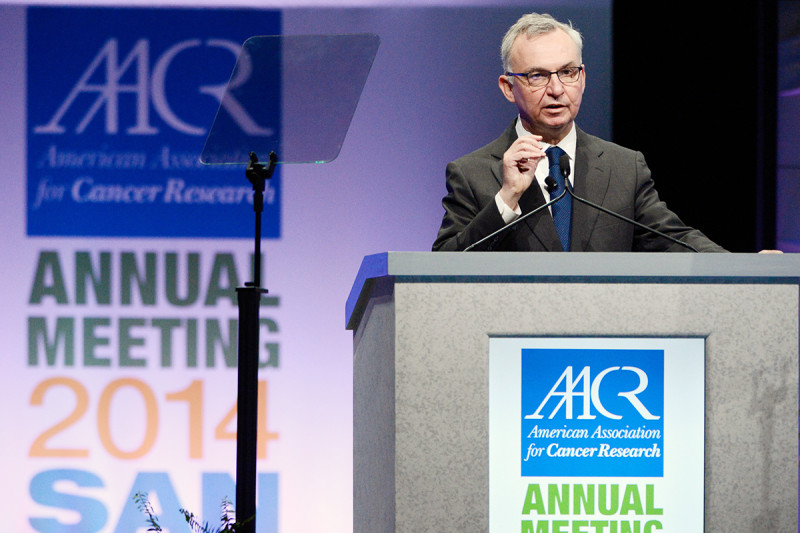
Two Memorial Sloan Kettering studies about targeted cancer therapies received recognition in the press program for one of the nation’s premier cancer research events: the American Association for Cancer Research (AACR) Annual Meeting 2014, held April 5–9 in San Diego. The press program highlights cancer research that a panel of AACR experts considers the most significant of the year and deserving of media attention.
In addition, several Memorial Sloan Kettering investigators received awards and assumed leadership roles.
The AACR meeting brings together roughly 18,000 researchers, patient advocates, and other professionals in the cancer field to present the latest basic, translational, and clinical discoveries. Memorial Sloan Kettering cancer biologist Scott Lowe, who chairs the Geoffrey Beene Cancer Research Center, served as the meeting’s Scientific Program Committee Chairperson.
Novel Compound Shows Clinical Activity in Blood Cancers
Medical oncologist Eytan Stein presented data from an early-stage clinical trial investigating a new drug for patients with advanced blood cancers, specifically acute myeloid leukemia (AML) and myelodysplastic syndrome (MDS). The drug, called AG-221, targets a protein produced by the mutated form of a gene known as IDH2.
IDH2 normally makes a protein that plays a critical role in cell metabolism. However, when the gene is mutated, it can lead to the production of an abnormal protein that is thought to cause some types of cancer — including AML and MDS — by preventing healthy bone marrow cells from maturing.
Dr. Stein presented preliminary results on ten patients who received one of two doses of AG-221 twice daily. Three patients were not able to complete a full cycle of therapy due to complications of their disease, but six of the remaining seven patients had responses, including three complete remissions.
While phase I clinical trials are designed primarily to determine the safety and tolerability of a new drug, Dr. Stein said he is encouraged by the results he’s seen thus far with AG-221 and its implications for the emerging field of targeting cancer metabolism.
Read coverage of Dr. Stein’s research by Forbes and Reuters.
Identifying Mechanism by Which Tumors Become Resistant
Graduate student Pau Castel presented data that shed light on why some cancers become resistant to targeted therapies.
BYL719 is an investigational drug that targets PI3K-alpha, a gene known to be mutated in a third of breast cancers and to play an important role in the disease. Castel and his colleagues sequenced the DNA of multiple metastatic tumors from a patient who initially responded dramatically to BYL719 but whose cancer eventually returned. Some of these metastatic tumors were sensitive to BYL719 while others proved resistant.
By comparing the DNA of the two tumor types, the researchers found that the resistant tumors had different mutations in the gene PTEN that may have caused the drug to stop working. The responsive tumors contained normally functioning PTEN genes.
Using mouse models, the researchers were able to show that combining BYL719 with a drug that targets another protein responsible for the resistance “reeducated” the cancer to respond to treatment. Castel said that the results stress the importance of developing dynamic therapy so that physicians can adjust treatment as tumors evolve and acquire new mutations that cause drug resistance.
Awards and Appointments for Memorial Sloan Kettering Staff
Several Memorial Sloan Kettering investigators were honored at the meeting.
- Memorial Sloan Kettering Physician-in-Chief José Baselga officially became president-elect of the AACR and will serve for one year as President beginning in 2015. Read more about Dr. Baselga’s honor. Dr. Baselga will assume this post just a year after Charles Sawyers, Chair of Memorial Sloan Kettering’s Human Oncology and Pathogenesis Program, completed his term as AACR President this month.
- Jedd Wolchok, Chief of Memorial Sloan Kettering’s Melanoma Service, was honored with the 38th Annual AACR Richard and Hinda Rosenthal Memorial Award. The $10,000 award supports investigators who are younger than 50 and are making notable contributions to improving clinical cancer care. Dr. Wolchok was recognized for his contributions to the field of immunotherapy for melanoma.
- Steven Leach, Director of Memorial Sloan Kettering’s new David Rubenstein Center for Pancreatic Cancer Research, will be a principal investigator on a new Stand Up To Cancer (SU2C)-Lustgarten Foundation “Dream Team” dedicated to pancreatic cancer research. The Dream Team, announced at a press event during the meeting, will develop new therapies that exploit patients’ own immune cells to treat cancer. The AACR is SU2C’s Scientific Partner.
- Maurizio Scaltriti, an Assistant Lab Member in the Human Oncology and Pathogenesis Program (HOPP), was named one of the AACR’s “NextGen Stars.” For the first time, the AACR accepted applications from early-career investigators to present their research during selected major symposia. Dr. Scaltriti was chosen as one of five investigators from more than 100 applicants.







